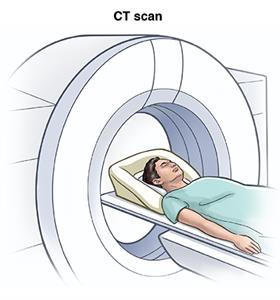Cerebral Abscess
What is a cerebral abscess?
A cerebral abscess is a pus-filled pocket of infected material in your brain. It is sometimes called a brain abscess.
An abscess can cause your brain to swell, putting harmful pressure on brain tissue. An abscess can also keep blood from flowing to parts of your brain. If you develop this problem, you will need emergency treatment.
What causes a cerebral abscess?
A cerebral abscess often occurs when bacteria or fungi make their way into your brain. This can happen either through your bloodstream or from an infected area in your head, such as your ears or sinuses. An injury to your head or head surgery can also let in germs that can cause an abscess.
Who is at risk for cerebral abscess?
The following raises your risk for a cerebral abscess:
-
Heart defects
-
HIV/AIDS or other conditions that affect your immune system
-
Medicines that inhibit your immune system
-
Recent injury to your head or head surgery (including dental procedures)
-
History of intravenous (IV) drug abuse
What are the symptoms of a cerebral abscess?
A cerebral abscess can cause many symptoms, including:
-
Headaches
-
Fevers and chills
-
Going in and out of consciousness
-
Visual disturbances
-
Weakness on one side of your body
-
Nausea and vomiting
-
Seizures
-
Changes in personality
-
Confusion
-
Trouble moving or speaking
-
Stiffness in the neck or back
How is a cerebral abscess diagnosed?
Your healthcare provider will ask about your symptoms. They may do a neurological exam to look for changes in motor and sensory function, vision, coordination, and balance. Your healthcare provider will also check your mental status and mood or behavior. You may also need tests, such as:
-
MRI or CT scan of your head
-
Blood tests to look for signs of germs and other signs of infection
-
Tests of a sample from the abscess to determine the cause of your infection
 |
| XTiss_20140225_v1_001 |
How is a cerebral abscess treated?
Your healthcare provider can treat cerebral abscesses with medicines. These include:
You may also need surgery, especially for larger abscesses. Your surgeon will go through your skull to expose your brain. They will drain material in the abscess and, if possible, remove it entirely. If the abscess is deep in your brain, your surgeon may need to drain it with a needle, with help from a CT or MRI scan. These help direct the needle to the right area.
What are possible complications of a cerebral abscess?
Treating a cerebral abscess right away is very important. Without treatment, very serious complications can set in, including death. Even with treatment, some people might have long-term nervous system problems, such as weakness or paralysis.
What can I do to prevent a cerebral abscess?
If you have an infection elsewhere in your body, make sure it's correctly treated. This may help prevent a cerebral abscess. If your healthcare provider has suggested that you take antibiotics before certain procedures, such as dental work, be sure to follow these directions.
When should I call my healthcare provider?
Treating a cerebral abscess as soon as possible is essential. Call your healthcare provider right away if you have:
-
Unusual neck stiffness
-
Vomiting
Call 911 if any of the following occur:
-
Any type of nervous system problem, such as seizures or changes in consciousness
-
Fever with a bad headache
If you already have a cerebral abscess and are being treated, it's very important to tell your healthcare provider if any of your symptoms get worse, or if you develop any new symptoms. These could be signs that your infection is getting worse, despite treatment.
Key points about cerebral abscess
-
A cerebral abscess is an infection in your brain. It is a medical emergency that needs treatment right away.
-
Symptoms can include headache, fever, changes in consciousness, confusion, neck stiffness, vomiting, seizures, weakness, trouble moving, and changes in vision.
-
Treatment is with strong antibiotics. You may also take other medicines, such as steroids or those to prevent seizures. Surgery might be needed to drain the fluid from the abscess or to remove it completely.
Next steps
Tips to help you get the most from a visit to your healthcare provider:
-
Know the reason for your visit and what you want to happen.
-
Before your visit, write down questions you want answered.
-
Bring someone with you to help you ask questions and remember what your provider tells you.
-
At the visit, write down the name of a new diagnosis, and any new medicines, treatments, or tests. Also write down any new instructions your provider gives you.
-
Know why a new medicine or treatment is prescribed, and how it will help you. Also know what the side effects are.
-
Ask if your condition can be treated in other ways.
-
Know why a test or procedure is recommended and what the results could mean.
-
Know what to expect if you do not take the medicine or have the test or procedure.
-
If you have a follow-up appointment, write down the date, time, and purpose for that visit.
-
Know how you can contact your healthcare provider if you have questions, especially after office hours or on weekends and holidays.